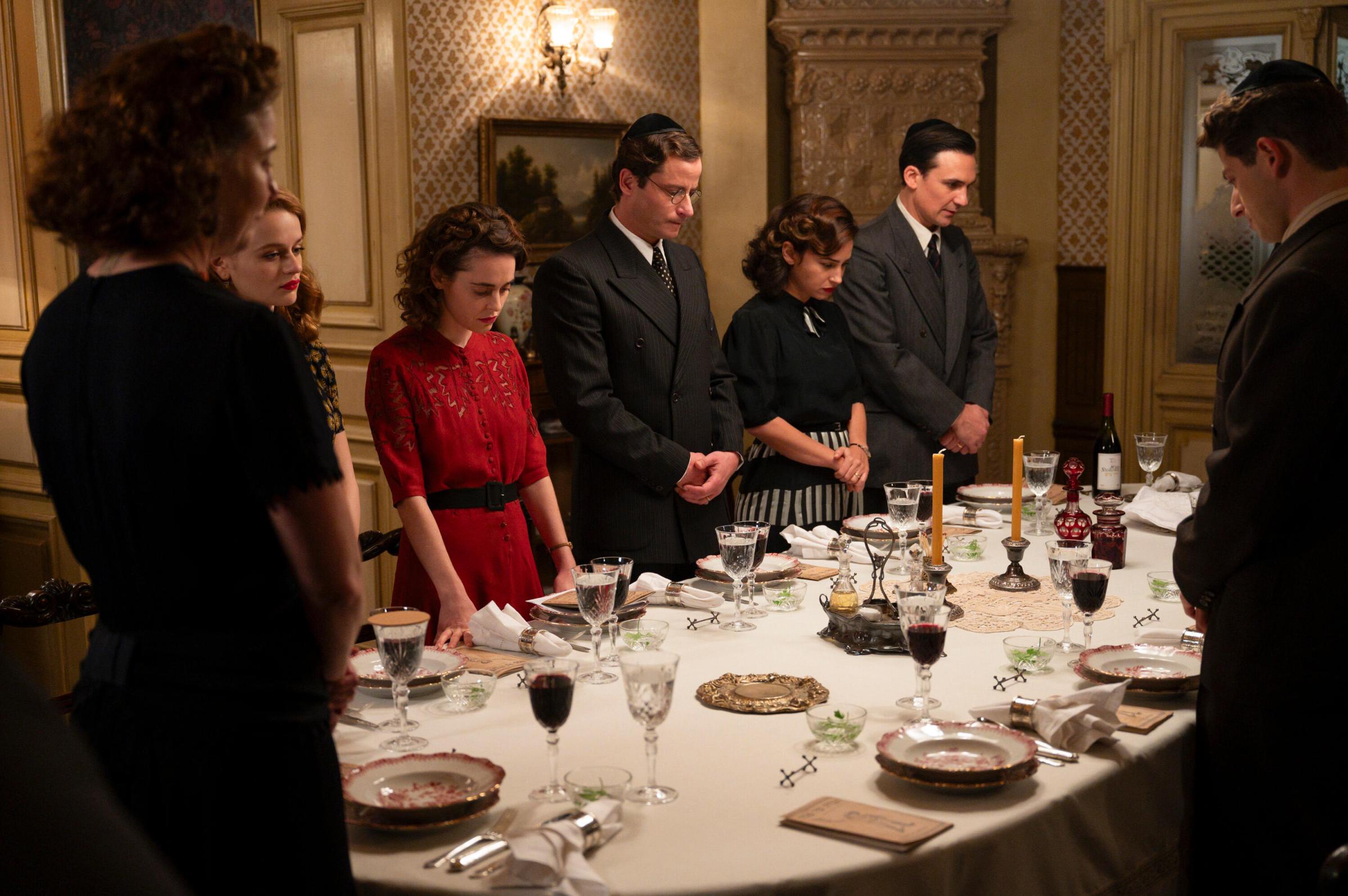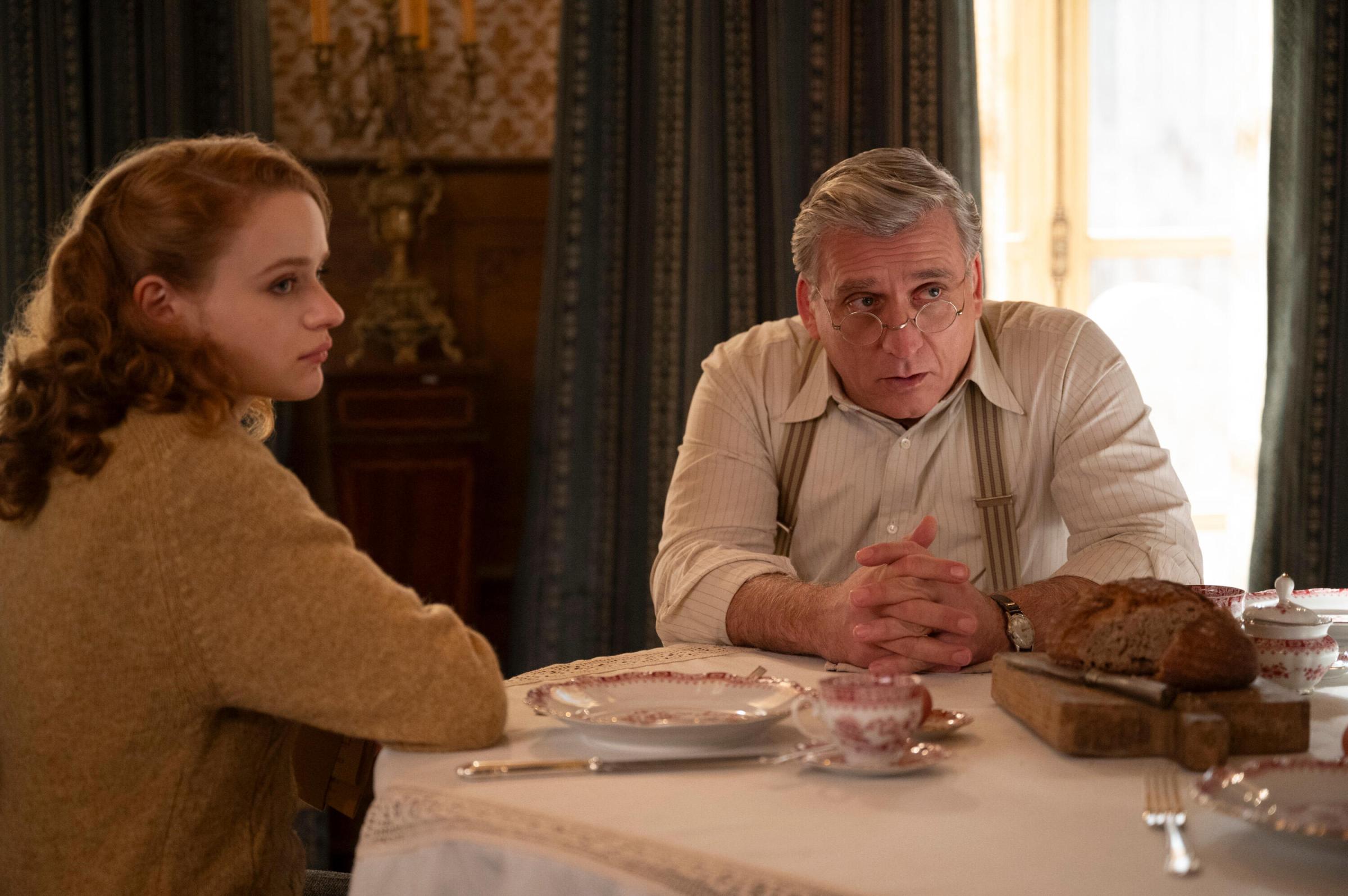Among the many misperceptions about the Holocaust that well-meaning Hollywood creators have unwittingly perpetuated, the most damaging has been the idea that Jews were passive victims, complacently herded into airless train cars to be exterminated at death camps. Bloody revenge fantasies like Quentin Tarantino’s Inglourious Basterds aside, realistic accounts of Jewish self-defense in the face of Nazi annihilation have been few and far between. We Were the Lucky Ones, Hulu’s eight-part adaptation of the novel by Georgia Hunter, provides a rare counter-narrative of courageous resistance. Yet it still falls prey to many of the tear-jerking, experience-flattening conventions that rob so much Holocaust fiction of specificity and insight.
Premiering March 28, Lucky Ones spans nearly a decade in the lives of the Kurcs, a big, affectionate, upper-middle-class Jewish family based in Radom, Poland. We meet them in 1938, on the day Addy (Logan Lerman), a composer of some renown in Paris, arrives at his parents’ (Robin Weigert and Lior Ashkenazi) apartment for Passover. His sister Mila (Hadas Yaron) is expecting her first child with her husband, Selim (Michael Aloni). Their brother Jakob (Amit Rahav) seems more passionate about his girlfriend, Bella (Eva Feiler), than he is about his studies in law school. Eldest child Genek (Henry Lloyd-Hughes) is their father’s protégé and confidant.

With apologies to Addy, the family’s real hero is youngest daughter Halina, a clever, willful, vivacious young woman played by The Act and The Kissing Booth star Joey King. She’s got her eye on the architect lodger her parents have taken in, Adam (Sam Woolf), perhaps in the hope of forging a love connection. More urgent, in her mind, is her search for a direction in life. After nervous whispers about a spike in local antisemitism presage Germany’s sudden invasion of Poland, Halina finds that purpose in working for the anti-Nazi resistance—and, more so, in scrambling to keep her parents and siblings safe. As the years go on and the persecution Jews face intensifies, she will lie, bribe, fight, scheme, embark upon long, perilous journeys, and endure all manner of torture in a tireless quest to ensure that the Kurcs survive the Holocaust.
Although it’s based on a true story, Lucky Ones verges on unbelievability in its depiction of the sheer variety of World War II-era horrors the Kurcs survive, across four continents. Some depart for Soviet-controlled Lvov, to take their chances with Stalin; a storyline set at a grueling Siberian work camp follows. Those who stay in Radom see their homes seized, their jobs eliminated, their businesses stolen. After the Nazis invade France, Addy winds up on a boat headed for Brazil—but there will be many unanticipated stops on his voyage to freedom. Meanwhile, there are pogroms, ghettos, firing squads, Jews posing as virulently antisemitic gentiles, nuns paid to hide a young child at an orphanage, brief glimpses inside concentration camps and at Senegal under Vichy rule.

The breadth of experiences the series depicts, and its concentration on Jews who did not go quietly from their living rooms to the gas chambers, could make it a useful teaching tool. Which is not to say it’s dry; I was in tears for much of the finale, thanks to performances that are universally convincing and in some cases, like King’s and Lerman’s, excellent. (I do wish Weigert, who’s been brilliant in shows like Deadwood and Jessica Jones, had been given more to do.) And while it can be confusing to watch characters speak Polish-accented English in Radom and French-accented English in Paris for the sake of subtitle-wary American audiences, I appreciate showrunner Erica Lipez’s (The Morning Show) choice not to over-explain Jewish culture.
Despite its many virtues, Lucky Ones falls into the same traps as too many other Holocaust dramas. The script can be quite lazy, filled with whole sentences we’ve heard before: “All of Europe has gone mad.” “Why won’t you let me love you?” “The Germans are coming!” There are so many Kurcs, each with their own significant other, that everyone besides Halina and Addy can seem interchangeable. This is, in part, due to the noble yet nonspecific personality with which each is endowed by virtue of being a Jewish character in a show about the Holocaust. And when a Kurc survives where we watch other, anonymous Jews perish, the likely inadvertent but nonetheless offensive implication is that they’re superior to the millions across Europe who weren’t so lucky—smarter, tougher, more empowered by their love for one another.
Anyone with a functioning heart will find this family’s story moving. Viewers whose education on the Holocaust has come solely from Hollywood might even find it enlightening. What it lacks, as a work of art (it would be grotesque to call it a work of entertainment), is the level of insight that might justify putting us through eight hours’ worth of human misery. What does it mean that not just the Nazis, but essentially the entire world, made it impossible for Jews to find safety during World War II? How does the Kurcs’ saga speak to the world’s current refugee crises? How does it mirror the family separations that happen at the United States’ own southern border? With so many Holocaust dramas, on screens big and small, vying to yank our heart strings, the bar for a truly crucial example is high. We Were the Lucky Ones comes close but doesn’t clear it.
More Must-Reads from TIME
- Caitlin Clark Is TIME's 2024 Athlete of the Year
- Where Trump 2.0 Will Differ From 1.0
- Is Intermittent Fasting Good or Bad for You?
- The 100 Must-Read Books of 2024
- Column: If Optimism Feels Ridiculous Now, Try Hope
- The Future of Climate Action Is Trade Policy
- FX’s Say Nothing Is the Must-Watch Political Thriller of 2024
- Merle Bombardieri Is Helping People Make the Baby Decision
Contact us at letters@time.com